hkparker
National Hazard
   
Posts: 601
Registered: 15-10-2010
Location: California, United States
Member Is Offline
Mood: No Mood
|
|
How should I clean my mercury?
I have about 20ml of Hg that I got from old switches, however, I believe that there is contamination of other metals, especially Iron. I would like
to dissolve out the iron but be sure that I will <u>not</u> make any soluble mercury salts. HCl comes to mind, but if
FeCl<sub>3</sub> is produced it will oxidize some mercury out. What else can I use?
My YouTube Channel
"Nothing is too wonderful to be true if it be consistent with the laws of nature." -Michael Faraday
|
|
|
UnintentionalChaos
International Hazard
    
Posts: 1454
Registered: 9-12-2006
Location: Mars
Member Is Offline
Mood: Nucleophilic
|
|
I'm not sure that's possible to make no Hg salts....iron is so insoluble in mercury that mercury is shipped in iron containers, I wouldn't worry about
that.
This might be an interesting read: http://pubs.acs.org/doi/abs/10.1021/ja01164a053
Department of Redundancy Department - Now with paperwork!
'In organic synthesis, we call decomposition products "crap", however this is not a IUPAC approved nomenclature.' -Nicodem
|
|
|
hkparker
National Hazard
   
Posts: 601
Registered: 15-10-2010
Location: California, United States
Member Is Offline
Mood: No Mood
|
|
Thanks UnintentionChaos! Ok so I was wrong about the Fe, but I do believe something is dissolved in there. Ill pour it into water and maybe add some
HCl. I say there's something in there because one of the switches had a black powder in it that seemed to go away over time.
My YouTube Channel
"Nothing is too wonderful to be true if it be consistent with the laws of nature." -Michael Faraday
|
|
|
UnintentionalChaos
International Hazard
    
Posts: 1454
Registered: 9-12-2006
Location: Mars
Member Is Offline
Mood: Nucleophilic
|
|
There are quite a few threads on mercury cleaning already, including these:
http://www.sciencemadness.org/talk/viewthread.php?tid=11775
http://www.sciencemadness.org/talk/viewthread.php?tid=3743
[Edited on 3-23-11 by UnintentionalChaos]
Department of Redundancy Department - Now with paperwork!
'In organic synthesis, we call decomposition products "crap", however this is not a IUPAC approved nomenclature.' -Nicodem
|
|
|
gsd
National Hazard
   
Posts: 847
Registered: 18-8-2005
Member Is Offline
Mood: No Mood
|
|
1) Mercury does not react with dilute HCl at room temp.
Reaction with dHCl followed by water washing wil certainly remove Fe as FeCl2 and many other amalgamated impurities like Zn, Al etc.
2) Problem with Hg is all insoluble impurities float on it. Hence even trace amount of it tarnishes otherwise mirror like surfce. Best way to remove
it is by filtering thru' a clean muslin cloth.
Gsd
|
|
|
Arthur Dent
National Hazard
   
Posts: 553
Registered: 22-10-2010
Member Is Offline
Mood: entropic
|
|
And also the simple trick of using a funnel with a filter paper, and poke a tiny hole at the apex of the cone and slowly let the mercury drip in a
vessel.
Robert
--- Art is making something out of nothing and selling it. - Frank Zappa ---
|
|
|
Jor
National Hazard
   
Posts: 950
Registered: 21-11-2007
Member Is Offline
Mood: No Mood
|
|
I had some dirty mercury, wich grey stuff on top of it. I put it in a beaker, added some dilute HCl and a spatula of tin(II) chloride dihydrate. This
makes very nice clean shiny Hg, and leaves no Hg waste, as no mercury can dissolve in this solution as it will be reduced.
|
|
|
hkparker
National Hazard
   
Posts: 601
Registered: 15-10-2010
Location: California, United States
Member Is Offline
Mood: No Mood
|
|
Thanks Jor, ill trry that
My YouTube Channel
"Nothing is too wonderful to be true if it be consistent with the laws of nature." -Michael Faraday
|
|
|
S.C. Wack
bibliomaster
    
Posts: 2419
Registered: 7-5-2004
Location: Cornworld, Central USA
Member Is Offline
Mood: Enhanced
|
|
Not extremely fast and simple, but seemingly very effective:
http://www.sciencemadness.org/talk/viewthread.php?tid=10222#...
All the shaking and the happy ending might even cure the phobic.
|
|
|
Wizzard
Hazard to Others
  
Posts: 337
Registered: 22-3-2010
Member Is Offline
Mood: No Mood
|
|
Black crap inside switches could have been some of the mercury (or oil?) burned in the small arc making the electrical connection.
|
|
|
The WiZard is In
International Hazard
    
Posts: 1617
Registered: 3-4-2010
Member Is Offline
Mood: No Mood
|
|
Mercury the Purest Metal
Quote: Originally posted by hkparker  | | I have about 20ml of Hg that I got from old switches, however, I believe that there is contamination of other metals, especially Iron. I would like
to dissolve out the iron but be sure that I will <u>not</u> make any soluble mercury salts. HCl comes to mind, but if
FeCl<sub>3</sub> is produced it will oxidize some mercury out. What else can I use? |
Me the Analogue guy again.
AG returns from one of his file cabinets — scan's and posts :—
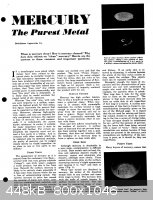 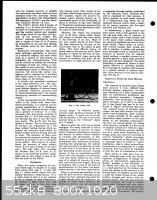 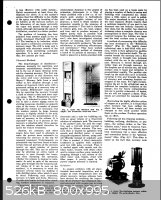 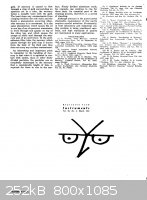
|
|
|
The WiZard is In
International Hazard
    
Posts: 1617
Registered: 3-4-2010
Member Is Offline
Mood: No Mood
|
|
Higher Mercury Purity for Rocket and Missiles
Me the Analogue guy again.
AG returns from one of his file cabinets — scan's and posts, too :—
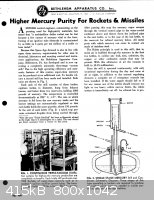

|
|
|
The WiZard is In
International Hazard
    
Posts: 1617
Registered: 3-4-2010
Member Is Offline
Mood: No Mood
|
|
Send it out to the cleaners
Quote: Originally posted by hkparker  | | I have about 20ml of Hg that I got from old switches, however, I believe that there is contamination of other metals, especially Iron. I would like
to dissolve out the iron but be sure that I will <u>not</u> make any soluble mercury salts. HCl comes to mind, but if
FeCl<sub>3</sub> is produced it will oxidize some mercury out. What else can I use? |
http://www.bethlehemapparatus.com/
Sez -
Bethlehem Apparatus operates the world's largest commercial
mercury recycling facility in North America with over 100,000 sq.
ft. of specialized systems and proprietary processes in continuous
operation. We have the capacity to process from a few ounces to
truckloads of 55-gallon drums efficiently and cost effectively.
Annually we process over 1000 tons of mercury waste. Our
facilities and capabilities include:
29 advanced programmable high vacuum retorts with a capacity of
over seven tons per day
8 quadruple distillation systems
2 continuous feed fluorescent lamp glass retorts
600 ton Calomel processing plant
20,000 mercury flasks (76lb) per year capability
100,000 gallons per year capacity water purification system
Over 50,000 sq. ft. of storage capacity
Ability to handle large volume requirements
djh
----
Road Rage
Rattled
The latest battle over license plates
But for whom does a license plate speak? In a sense, it clearly speaks for
the government. It communicates that a particular car has been registered
by a particular state. But the law also recognizes that the humans in charge
of the car have some say, too. The Supreme Court recognized as much in a
1977 decision, Wooley v Maynard, which held that New Hampshire could
not require plates bearing the state motto "Life Free or Die". Alternatives
had to be introduced (presumably to cater for those who preferred a life
of servitude).
The Economist 11xii10
|
|
|
hkparker
National Hazard
   
Posts: 601
Registered: 15-10-2010
Location: California, United States
Member Is Offline
Mood: No Mood
|
|
Thanks WiZard! Im going to try the dilute HCl/SnCl2 first, and ill let you know how it goes. Distillation is something im capable of, I'm just too
afraid of Hg gas!
My YouTube Channel
"Nothing is too wonderful to be true if it be consistent with the laws of nature." -Michael Faraday
|
|
|
spong
Hazard to Others
  
Posts: 128
Registered: 28-5-2009
Location: Chatham
Member Is Offline
Mood: No Mood
|
|
I got some mercury from some old tilt switches too and have had exactly the same problem, I could filter it through the filter paper cone with hole in
it and that would give it a shiny surface again but once it was bottled it would gradually get a gray scum layer on the surface. I haven't bothered to
clean it any further since then but that HCl or SnCl2 method might be worth a try, I think the layer on mine is due to dissolved Al reacting with
oxygen.
|
|
|
HHammerHeadD
Harmless

Posts: 11
Registered: 27-3-2011
Member Is Offline
Mood: No Mood
|
|
cleaning Hg
Quote: Originally posted by hkparker  | | I have about 20ml of Hg that I got from old switches, however, I believe that there is contamination of other metals, especially Iron. I would like
to dissolve out the iron but be sure that I will <u>not</u> make any soluble mercury salts. HCl comes to mind, but if
FeCl<sub>3</sub> is produced it will oxidize some mercury out. What else can I use? |
for around 80 bux and some ice and an alcohol burner, you can log on to ebay, and search for what is known as, a retort. you place your merc in the
heat chamber screw on the cap, fill the cooling chamber with ice and water , so that when you heat the merc in the chamber, it gets evaporated and
reconstitutes in the cooling chamber, and it drips out the end into a glass of water, and the tube is submerged in the water...when nothing comes out,
after you seen it drip, remove the flame or heat source and let coold down...\you will have any contaminants in the cap where you placed the merc.
this is the best way to clean mercury, cinnabar, quicksilver, Hg, the QuickSilver Messenger Service @ ur service. you could use a soxtet tube, if you
are experienced
http://cgi.ebay.com/MERCURY-RETORT-GOLD-RECOVERY-/2607571654...
|
|
|
HHammerHeadD
Harmless

Posts: 11
Registered: 27-3-2011
Member Is Offline
Mood: No Mood
|
|
you guys have too much time on your mind if you think chemically processing mercury is going to help.\but thats what folks do...I find that the proven
methods work the best.\I use mercury for almagating gold & platnium. I don't touch it with my skin, and I stand upwind when I retort, and the only
time I use mercury with any chemical is when I have a sponge of almalgam/ merc-gold/platnium dull grey looking 'sponge'...when nitric acid is heated
with the sponge at the bottom of a beaker, it suspends the mercury in acid, and fuses the gold together to form a 'nugget'. you can recover the
mercury, at room temperature, by submerging copper plates, small, into solution, and watch it accumilate. oh well. good luck with your mercury... my
favorite trick is to 'bleed' mercury out of rocks.\for that is where it came from to start with...its as old as time itself, and everytime there is a
forest fire, lightning strike and rain, it bleeds into the waterways...and since it is found in nature, you know the old-timers, didn't just deposit
it in the water...the old timers who were geologically challenged, knew exactly where to get it, and how to work with it. Assayers from Nero's day
|
|
|
HHammerHeadD
Harmless

Posts: 11
Registered: 27-3-2011
Member Is Offline
Mood: No Mood
|
|
first you should study mercury, its origin and property's...\ as you know when mercury gets warmer, it swells, rises on a thermometer...when it gets
too hot, it evaporates, and POISON it IS...\
and the trace elements that are associated with mercury is probly what you have been seeing.
some nasty crapola. you need ventilation as well...but, live and learn, and STAY ALIVE by
\SAFETY 1ST and foremost. have a nice day.
|
|
|
Endimion17
International Hazard
    
Posts: 1468
Registered: 17-7-2011
Location: shores of a solar sea
Member Is Offline
Mood: speeding through time at the rate of 1 second per second
|
|
At my first attempts, I was discarding the floured mercury in a separate bottle. But that doesn't really have much sense because from time to time,
new oxide will form if the metal is not very pure, which mine wasn't. So eventually, I'd run out of it. Over the years, I managed to get hold of small
amount of really dirty sample with actual dirt in it.
So I came to an idea. Why destroying the impurities by converting them into soluble ionic mercury, and thus again ending with less and less of the
metal, if I could reduce them back to metal?
Here where I live, we've got endless supplies of sodium metabisulfite, used for preserving wine. Even grocery stores have relatively large amounts,
especially in the fall, when wine making season starts. So naturally, this is what I used.
We've got aqueous solutions of sulfur(IV) oxide, too, but for some reason, I never tried that.
So here are the instructions:
- dump everything in a large beaker
- add room temeprature hydrochloric acid (we've got 19% here, that's OK) and wait for half an hour gently mixing, swirling
- discard the sludge (organic particles) in a separate container, filter it and using aliquotes, see which amount of concentrated aqueous solution of
sodium metabisulfite reduces the most of the ions, and if it actually does, add the proper amount of the reducer in the sludge container, wash the
mixture with water and add the formed mercury droplets to the main beaker
- the rest of the dirty mercury should be washed by gently pouring in water, which carries the lighter organic particles out ( dense insoluble dirt
such as glass remains at the bottom)
- pour in a concentrated solution of Na-metabusulfite and swirl; in a few seconds, the disgusting layer will mostly be gone
- wash with water, but do not agitate and do not bubble air trough
- decant the water
- dry the metal using pieces of filter paper and pick up the big debris
- filter the metal through a pierced filter paper funnel
Now you've got a pretty pure metal, but if you want to go purer, read on:
- pour the metal into a plastic bottle, add diluted HCl 10-20% and shake vigorously for 10 min (half an hour, an hour if you're a wacko like me) to
disperse it really good and leech out the base metals, let it settle and then wash with water
- add 5% nitric acid and shake lightly for a few minutes (skip this if you want), then wash with water
- optionally, gently swirl with small amount of ethanol 2-3 times (the purer the better) to get rid of any grease film, then gently with pure water
- dry using filter paper as before
- load a syringe (20, 50 ml) tip with cotton and place it in a smaller beaker so that it firmly sits atop another little cotton cushion
- load the mercury in the syringe and slowly push in the piston, just barely enough to start the mercury seeping trough the cotton filters; be patient
- put the mercury in a plastic bottle as it's the safest option, and leave it dry, just cap the bottle firmly
Usind this procedure, I've got mercury which was so squeaky clean it was bouncing off the glass walls like it should, producing that specific squeaky
sound of "pure mercury against pure glass". 
More than one year after that, it remained without tarnish, no matter the bottle was opened a few times. I think this is the closest I've ever came to
pure mercury, as I refuse to distill it because that's just too dangerous. It's reflecting, flows evenly, dissolves in nitric acid without
leftovers...
|
|
|
peach
Bon Vivant
    
Posts: 1428
Registered: 14-11-2008
Member Is Offline
Mood: No Mood
|
|
Spurred on by the Wizard;
<iframe sandbox width="640" height="390" src="http://www.youtube.com/embed/PwbM5ZxVBzk" frameborder="0" allowfullscreen></iframe>
|
|
|
hkparker
National Hazard
   
Posts: 601
Registered: 15-10-2010
Location: California, United States
Member Is Offline
Mood: No Mood
|
|
Nice! Doing that has always scared the crap out of me, Hg fumes are no fun, but I've always thought it would be cool to distill mercury.
Also, wow that 15lbs is crazy!
My YouTube Channel
"Nothing is too wonderful to be true if it be consistent with the laws of nature." -Michael Faraday
|
|
|
Endimion17
International Hazard
    
Posts: 1468
Registered: 17-7-2011
Location: shores of a solar sea
Member Is Offline
Mood: speeding through time at the rate of 1 second per second
|
|
The attempt shown in the video is one of the dumbest I've seen in my life. No offense, but hey - glass apparatus with water cooler? Mercury boils at
almost 357 °C, and water cooler uses tap water at some 15 °C. More than 300 degrees of difference is a recipe for borosilicate glass breaking. You
simply don't use that kind of glass for these kinds of things. It's a laboratory rule.
Not just that. I see no tray of any kind. What if something breaks? Boiling mercury will spill on the desk and onto the floor,
creating at least tens of square meters of hot metal surface which fumes so greatly it will certainly give a heavy acute poisoning to a panicked
person trying to contain the spill.
The basic rule when you handle mercury is to handle it over a tray. Always.
Even with cautious handling, after some time you'll find tiny droplets on the tray.
I mean, holy shit. These guys were almost in a situation where the boiling flask breaks and the boiling continues in the sand bath, spilling over the
desk and the floor. Instant poisoning and a hazmat situation. I don't think they realize just how dangerous this is. They think they've got control
over the situation, but they don't.
These distillations are done in a steel retort with water cooling (periodically wetting the cloth around the neck is enough), and they're done
outside, down the wind, preferably away from people's homes. You take your mercury, a propane tank, a torch, a steel retort and some water, drive to a
remote place and stay upwind during the procedure.
And you never ever keep it in a thin glass jar with a ground glass stopper, especially not a large amount seen in the video. The bottom might just
fall off. It happens. It's documented and mentioned in lab manuals. Small amounts are ok for thickwalled bottles with rubber gasket caps. Polyethylene
bottles are very safe, too.
|
|
|